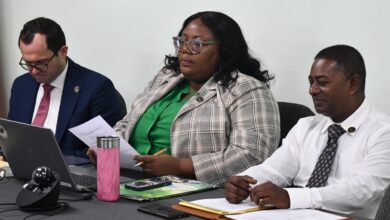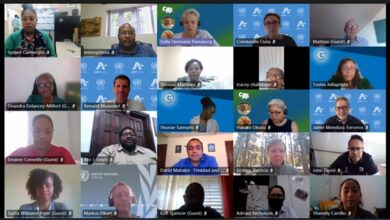Dominica and Grenada are now better equipped to manage and protect trade in wildlife following workshops the CARICOM Secretariat organised recently to ensure compliance with multilateral environmental agreements.
The workshops provided technical support to develop national, legal framework and institutional guidelines to implement the Convention on International Trade in Endangered species of Wild Fauna and Flora (CITES) to which all CARICOM Member States are signatories.
The sessions, which were held in March, attracted attendance from stakeholders in key sectors including customs, trade, national security, forestry, fisheries, legal affairs, ports management, private sector, indigenous communities, foreign affairs, public utilities and other key interest groups.

Teshia Jn Baptiste and Shunae Samuels, the CARICOM Secretariat team on the Multilateral Environmental Agreements (MEAs) in ACP countries (ACP-MEAS) Phase 3 Project, and Thomas Deleuil, Legal Officer and Haruko Okusu, Chief Outreach and Projects Unit, CITES Secretariat, facilitated the discussions.
In addition to building capacity and awareness of the implementation of the Convention in Dominica and Grenada, important outcomes of the sessions included sharing of experiences on CITES national legislation development by representatives of Antigua and Barbuda and St Kitts and Nevis. An open forum was also created to discuss and ensure understanding of the successes, challenges and best practices to incorporate CITES into the national legal system, taking into account existing legislations.
Effective CITES implementation and enforcement requires appropriate national legislation, transparent processes for the issuance of permits and certificates, capacity-building to make non-detriment findings and legal acquisition findings, training of staff to recognise listed species and look-alike species at ports of entry, development of guides and enhanced public awareness. Cooperation among the agencies is also key to ensure to complete implementation of the Convention.

© CARICOM
Highlighting the importance of the capacity-building exercises, Mr. Joseph Cox, CARICOM Assistant Secretary-General, Economic Integration, Innovation and Development said: “The Secretariat will continue to support the implementation and coordination of efforts to promote and develop policies for the protection of and preservation of the environment and for sustainable development which includes meeting the obligations of international and multilateral agreements.”
According to CITES Secretary-General Ms. Ivonne Higuero, “CITES provides a framework governing trade in these species to ensure that where this takes place, it is legal, sustainable and traceable for the benefit not only of our generation, but of those to come. For CITES, working in partnership has often proved the right approach to delivering better outcome.
Extremely high biodiversity
CARICOM is a Region of extremely high biodiversity. It includes Belize, which lies within the Mesoamerica hotspot for biodiversity; Guyana and Suriname, countries with globally significant tropical forest biodiversity; and many of the island nations that constitute the Caribbean Island Biodiversity Hotspot.
Endemism, which refers to plants and animals that are found nowhere else in the world, is particularly high in the Caribbean. Although the insular Caribbean makes up only 0.15% of the Earth’s land surface area, it contains 3% (180 species) of amphibians and over 6% (520 species) of reptiles. There are also estimated 7,800 endemic plants, and more than 170 endemic birds. Some species exist at extremely small population sizes. Since endemic species are found nowhere else, they are often in demand by collectors, making them in particular need of protection from illegal international trade.
Wildlife trade is valuable to the economies of the Caribbean region. A lot of the trade in listed species originating in the Caribbean is destined for international markets. Legal and sustainable trade can be beneficial for conservation of wild species, livelihoods, and economies. On the contrary, illegal and/or unsustainable trade can pose a serious risk to the species, people and business.

Some of the Caribbean species in trade include:
- Many coral species which are under pressure from coastal development, fishing and tourism. Exploitation of corals for the aquarium, ornament and jewellery trade is an additional burden on the Region’s reefs.
- Queen conch (Strombus gigas) which is harvested primarily for its meat. Shells and pearls are also traded internationally, the latter being rare and carrying very high prices.
- Rare endemic birds such as the endemic Amazona parrots of the Region have benefited from protection. Some Caribbean countries have export quotas for large numbers of wild-caught birds.
- Sea turtle species were formerly heavily traded on international markets for their meat, skins and/or shell.
- Plants such as Caribbean mahogany (Swietenia mahagoni) and Lignum vitae have been exploited heavily throughout the Region for timber. Trade in plants can also be difficult to regulate because they can easily be stowed in luggage or transported as seeds or cuttings.
For CARICOM media enquiries, please contact communications@caricom.org
For CITES media enquiries, please contact cites-media@un.org




